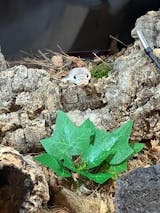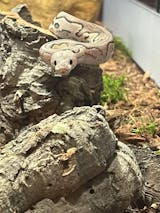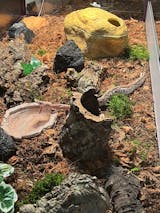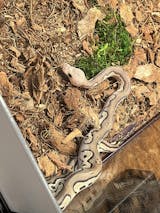Welcome to the ultimate guide on feeding your turtle with Zoo Med Turtle Food

As a turtle owner, providing proper nutrition is essential for the health and well-being of your shelled companion. In this comprehensive guide, we will delve into the world of turtle nutrition, exploring the specific dietary requirements of turtles and how Zoo Med Turtle Food can meet those needs. From understanding the importance of a balanced diet to learning about the various types of turtle food available, this guide will equip you with the knowledge and tools needed to ensure your turtle thrives. Whether you are a new turtle owner seeking guidance or a seasoned reptile enthusiast looking to enhance your pet's diet, this guide is designed to cater to all levels of experience. Join us on this educational journey as we uncover the secrets to keeping your turtle healthy and happy through proper nutrition.
Understanding Turtle Nutrition
Proper nutrition is crucial for the optimal health and well-being of pet turtles. In this comprehensive guide, we will explore the intricate dietary needs of turtles, focusing on essential components such as protein, vitamins, and minerals. Additionally, we will delve into the numerous advantages of maintaining a well-balanced diet to support the overall health of these fascinating reptiles.
Dietary Needs of Turtles
Protein Requirements
Turtles necessitate a diet abundant in protein to facilitate their growth and development. Sources rich in protein for turtles encompass insects, fish, earthworms, and select leafy greens. It is imperative to offer a diverse array of protein sources to adequately fulfill their dietary prerequisites.
Vitamin Intake
Vitamins play a pivotal role in sustaining the general well-being of turtles. Vitamin D, in particular, is crucial for calcium absorption and shell health. Turtles can acquire essential vitamins from a combination of high-quality commercial turtle pellets, assorted leafy greens, and periodic exposure to natural sunlight.
Mineral Necessities
Essential minerals like calcium and phosphorus are vital for upholding sturdy bones and a robust shell structure in turtles. Supplementation of calcium or inclusion of calcium-rich foods like cuttlebone in their diet can effectively stave off mineral deficiencies and promote skeletal health.
Benefits of a Balanced Diet
Enhanced Overall Health
A balanced diet ensures that turtles receive the requisite nutrients to fortify their immune system and ward off potential ailments. Through the provision of a varied diet, you can effectively sustain their overall health and vitality.
Prolonged Longevity
A nutritionally adequate diet can significantly contribute to the longevity of turtles. By adhering to a well-rounded diet that caters to their specific dietary needs, you can potentially extend their lifespan and sustain their vigor and liveliness.
Disease Mitigation
The implementation of a balanced diet plays a pivotal role in averting common health complications in turtles such as metabolic bone disease and shell deformities. Meeting their nutritional demands adequately can substantially diminish the likelihood of encountering these debilitating conditions.
Dietary Considerations
It is essential to consider the individual dietary preferences and requirements of different turtle species. Some species may necessitate a predominantly herbivorous diet, while others may thrive on a more omnivorous or carnivorous diet. Researching the specific dietary needs of your turtle species is crucial for tailoring a diet that aligns with their biological requirements.
A profound understanding of the nutritional requisites of turtles and the manifold benefits associated with a balanced diet is paramount in ensuring the sustained well-being and vitality of your aquatic or terrestrial shelled companions. By furnishing them with a diverse and nutrient-rich dietary regimen, you can actively promote their overall health, longevity, and resilience against potential health adversities.
Exploring Zoo Med Turtle Food
Zoo Med offers a diverse range of turtle food options specifically formulated to cater to the unique nutritional requirements of various turtle species. Delving deeper into the realm of Zoo Med turtle food unveils an array of choices, distinctive ingredients, and expert feeding recommendations.
Comprehensive Range of Zoo Med Turtle Food
-
Hatchling Formula: Tailored to nurture young turtles, providing essential nutrients for healthy growth and development.
-
Maintenance Formula: A well-balanced diet suitable for adult turtles to sustain optimal health and vitality.
-
Growth Formula: Engineered to bolster the growth phase of juvenile turtles, incorporating vital nutrients for development.
-
Specialized Diets: Explore specialized options such as aquatic turtle food, box turtle food, and more, each catering to specific species' needs.
Key Nutrients in Zoo Med Turtle Food
-
Vitamin D3: Vital for promoting calcium absorption crucial for maintaining shell integrity and overall well-being.
-
Calcium: Essential for shell formation and bone strength, ensuring structural robustness in turtles.
-
Protein: Facilitates muscle growth and supports overall development, vital for the health of turtles.
Feeding Guidelines and Recommendations
-
Diversified Diet: Enhance your turtle's nutrition by offering a varied selection of Zoo Med turtle food to fulfill dietary requirements.
-
Age and Size Considerations: Adhere to recommended feeding portions corresponding to your turtle's age and size, promoting balanced nutrition.
-
Dietary Supplements: Supplement your turtle's diet with fresh vegetables and occasional treats to introduce dietary diversity and enrichment.
Ensuring Proper Nutrition
-
Fiber Content: Zoo Med turtle food also contains appropriate fiber content to support healthy digestion in turtles, aiding in nutrient absorption and waste elimination.
-
Omega-3 Fatty Acids: Essential for maintaining skin and shell health, promoting a glossy appearance and overall well-being.
-
Phosphorus: A critical mineral for energy metabolism and bone mineralization, contributing to the overall vitality of turtles.
Variety and Enrichment
-
Treat Options: Consider incorporating Zoo Med's treat options to provide additional enrichment and mental stimulation for your turtle, encouraging natural foraging behaviors.
-
Freeze-Dried Foods: Supplement your turtle's diet with freeze-dried foods like shrimp, mealworms, or crickets to offer a diverse culinary experience.
By selecting Zoo Med turtle food, you are not only prioritizing your turtle's nutritional needs but also contributing to their overall health and well-being. Remember, a balanced and varied diet is key to ensuring your turtle thrives and leads a happy, healthy life!.
Tips for Feeding Your Turtle
Establishing a Feeding Schedule
Setting a Routine
Establishing a consistent feeding schedule is key to maintaining your turtle's health. Turtles thrive on routine, so try to feed them at the same time each day. This will help regulate their metabolism and prevent overeating.
Appropriate Portion Sizes
It's important to provide your turtle with the right portion sizes to prevent obesity or malnutrition. The general rule of thumb is to offer an amount of food that is roughly the size of its head. Adjust portion sizes based on your turtle's species, age, and activity level.
Monitoring Your Turtle's Eating Habits
Signs of Overfeeding or Underfeeding
Keep an eye on your turtle's eating habits to ensure it is consuming an appropriate amount of food. Signs of overfeeding include obesity, excessive waste, and uneaten food in the tank. On the other hand, if your turtle is losing weight or appears lethargic, it may be underfed.
Adjusting the Diet as Needed
Turtles' dietary needs can change based on factors such as growth, activity level, and health conditions. Be prepared to adjust their diet accordingly by consulting with a vet or doing research on the specific nutritional requirements of your turtle's species.
Providing a Balanced Diet
Variety is Key
Offering a diverse range of foods is essential to ensure your turtle receives all the necessary nutrients. Include items like leafy greens, vegetables, fruits, and occasional treats like insects or small fish to provide a balanced diet.
Calcium and Vitamin Supplements
To support your turtle's shell and overall health, consider providing calcium and vitamin supplements. These can be sprinkled over their food or offered in specific feeding sessions to ensure they get essential nutrients.
Hydration and Water Quality
Fresh Water Supply
Always make sure your turtle has access to clean, chlorine-free water for drinking and swimming. Regularly change the water in their tank to maintain good hydration and prevent bacterial growth.
Soaking Opportunities
Some turtle species benefit from occasional soaks in shallow water to aid in hydration and shell health. Providing a small dish or container for soaking can be beneficial, especially for semi-aquatic turtles.
Feeding Challenges and Solutions
Picky Eaters
If your turtle is a picky eater, try offering a variety of foods to entice them. Experiment with different textures and flavors to see what they prefer, but ensure that all options are safe and nutritious.
Illness or Digestive Issues
If you notice any changes in your turtle's eating habits, such as decreased appetite or digestive problems, consult a veterinarian promptly. Addressing health issues early can prevent complications and ensure your turtle's well-being.
By implementing these additional strategies and tips into your turtle's feeding routine, you can enhance their overall health and enjoyment. Remember, each turtle is unique, so observing their behavior and preferences is key to providing the best care possible.
Supplementary Care and Health Considerations
In this section, we will explore essential supplementary care practices to optimize a turtle's health alongside their diet. Additionally, we will delve into prevalent health issues concerning turtle nutrition and effective preventive measures to safeguard their well-being.
Importance of UVB Lighting and Proper Basking Areas
Dietary Diversity and Nutritional Enhancements
Tackling Vitamin Deficiencies
Physical Activity and Mental Stimulation
Recognizing Health Red Flags
Parasite Management and Treatment
Stress Alleviation Techniques
Ensuring adequate UVB Lighting and providing suitable basking spots are fundamental for maintaining a turtle's calcium metabolism, shell health, and overall vitality. Complementing a well-rounded diet with a mix of vegetables, fruits, and proteins is key in meeting their nutritional requirements. While nutritional supplements like multivitamins and calcium powder can be beneficial, moderation is crucial to prevent over-supplementation.
Vitamin deficiencies, particularly Vitamin A deficiency, can pose severe health risks, necessitating prompt intervention. Promoting physical exercise through swimming and offering enrichment activities such as puzzle feeders can prevent obesity and enhance mental engagement.
Regular veterinary check-ups are indispensable for early identification of health issues. Upholding cleanliness in the turtle's environment, including optimal filtration systems and water quality, is paramount in warding off infections.
Vigilance for signs of illness like lethargy, appetite loss, or abnormal behaviors is essential, prompting immediate veterinary attention when warranted. Implementing parasite prevention strategies through proper hygiene practices and routine fecal exams is pivotal for preserving your turtle's well-being.
Efficient stress management strategies like minimizing disturbances, gentle handling, and providing secure hiding spots within their habitat are vital for their mental and physical health.
By integrating these supplementary care practices into your turtle's daily regimen, you can bolster their health, mitigate common health issues, and ensure they lead fulfilling, healthy lives for years to come.
Conclusion
Providing the right nutrition to your turtle is crucial for its health and well-being. By using. Zoo Med Turtle Food , you can ensure that your pet receives a balanced diet that meets its dietary requirements. Remember to consult with a veterinarian or a reptile specialist to tailor the feeding regimen to your turtle's specific needs and enjoy a happy and healthy companion for years to come.











